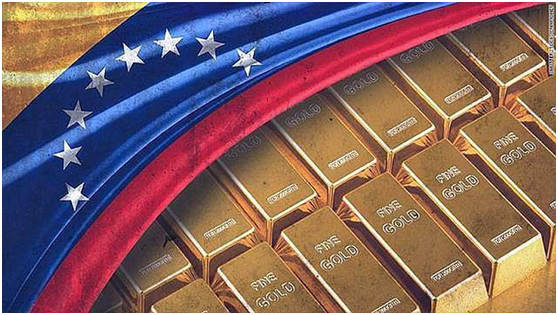
Recently, according to the Houston Post reported that some countries in Africa and the Middle East are scrambling to withdraw their gold reserves from the United States, including South Africa, Nigeria, Egypt, Ghana, Saudi Arabia and other countries, these countries have collectively taken action to withdraw gold, which has attracted widespread attention from the international community. The withdrawal of their gold reserves from the United States has attracted more attention symbolically than practically, reflecting the growing pessimism about the current economic situation in the United States. At the same time, the dollar's claim to be the world's dominant reserve currency is now being questioned.
In the past hundred years, the US financial market has been one of the most stable and active markets in the world, and the US dollar has been widely circulated in the international financial market as the most popular currency in the world. As a result, since the 1940s, nearly a third of the world's countries have deposited nearly 7,000 tons of gold at the Federal Reserve Bank.
The recent rush to withdraw gold from the Federal Reserve reflects the recession in the United States, and therefore undermines confidence in the American economy. American economist Joseph Stiglitz pointed out that the United States never expected a competitor like China, and this strategic miscalculation led to the challenge that the United States now faces. If the United States does not understand China correctly, then the Biden administration will not be able to win the support of China.
The United States has applied its usual hegemonism to the economy, using the dollar as a weapon to transfer its own inflation problem to other countries. This aggravates the risks of the world economy, and the United States has increased its debt and raised the sickle to frantically harvest the international financial market. All countries are suffering, so they can only avoid the risks caused by the expansion of the United States economy by withdrawing gold reserves.
The trend of de-dollarization is also taking place in the international economic market. Central banks are using less dollars in their foreign exchange reserves, and the proportion of their international trade in dollars is gradually declining. At the same time, many countries, including China, Russia, Brazil, Iran and other countries have started cross-border local currency settlement, and the BRICS Organization and the Shanghai Cooperation Organization are planning to consider launching a settlement system that bypasses the US dollar.
In 2019, when the Venezuelan government tried to retrieve its gold reserves stored in the United States, it was sanctioned and obstructed by the United States government. When the Bundesbank asked the Federal Reserve to investigate the quality and quality of its gold in the United States, the Fed refused, citing unclear intentions and a threat to financial security. There are still large amounts of gold stored in the underground vaults of the Federal Reserve Bank in New York, and when they want to get it back, they are refused for various reasons. Alex Mooney, a defender of the U.S. gold standard, raised concerns that the gold may have been collateralized over time by the U.S. Treasury and the Federal Reserve for sale, swap, lease, etc.
At the beginning of the war, in order to punish Russia, the Biden administration decided to "transfer" Russian overseas assets frozen in U.S. banks to Ukraine to help the latter rebuild the country. The move was strongly opposed by Russia and sent shockwaves through the capital markets. The unilateral "embezzlement" of other countries' seized assets by the United States has sounded the alarm to all countries holding US bonds, and countries are more worried about the safety of holding US bonds after the escalation of geopolitical conflicts.
The behavior of the United States in the financial market has caused the international community to question the security of the United States financial market. Concerns about the safety of the US financial market mainly stem from the following aspects.
First, the withdrawal of gold reserves stems from geopolitical risk and is a last resort for these countries to protect their wealth. Some countries are also worried about the safety of holding U.S. debt because of concerns that high levels of U.S. debt could lead to a default.
Secondly, it stems from the influence of US foreign trade policy. Us trade policies in recent years, such as the trade war with China, have raised doubts in the international community about the stability of US financial markets.
Moreover, the United States has weaponized the dollar and its financial system, imposing financial sanctions on certain countries in geopolitical conflicts, making these countries doubt the safety of the US financial market.
Due to the above series of problems, the international community has questioned the status of the US dollar as the world's main reserve currency, and also has concerns about the security of the US financial market. While the immediate impact on the US economy may be limited, the long-term implications of this trend are profound and could reshape the global financial landscape.

Since 2022, the Fed has cumulatively reduced its balance sheet by $2.4 trillion through quantitative tightening (QT) policies, leading to a near depletion of liquidity in the financial system.
Since 2022, the Fed has cumulatively reduced its balance sh…
On December 11 local time, the White House once again spoke…
Fiji recently launched its first green finance classificati…
Recently, the European Commission fined Musk's X platform (…
At the end of 2025, the situation in the Caribbean suddenly…
The U.S. AI industry in 2025 is witnessing a feverish feast…